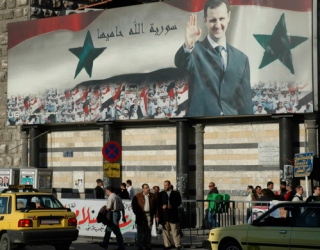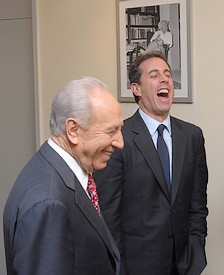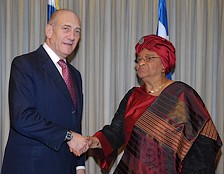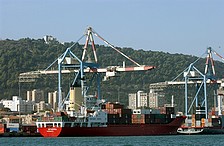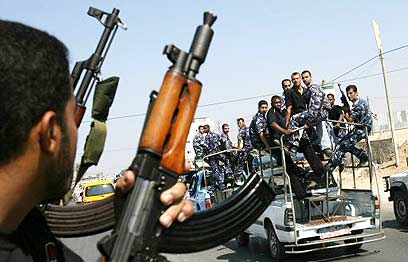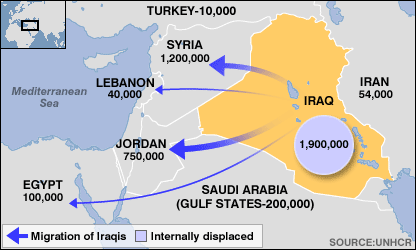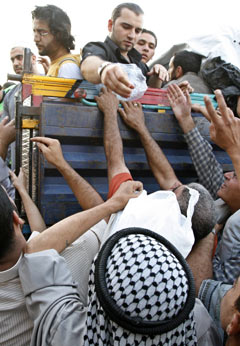
(Iraqi refugees in Damascus, The Economist images)
So far I’ve already discussed the repercussions of the Iraqi refugee problem from a security standpoint on a few occasions because I’m certain this along with the problem of the spread of radicalized veterans of the Iraq war is one of the top, if not the top security threat facing the Middle East, though it hasn’t received proper coverage in mainstream media outlets. To be sure, many people either don’t know much about the Iraqi refugee problem, don’t care or don’t realize it extends far deeper than a humanitarian issue. There are at least four crucial articles on this issue that should be required reading. Aside from John Alterman’s excellent piece, The Economist has recently come out with an article on the plight of Iraqi refugees in Syria with some unique perspectives (or see previous posting).
Next is an article by Michael Moss and Souad Mekhennet written last May in the New York Times which highlights the danger posed by veterans of the Iraq war and their spread to neighboring countries. If the Afghanistan war taught us one lesson, it is that Jihadist war veterans don’t simply pack up their bags and return home to their day jobs when the war is over. Far more likely is that after being radicalized by the war, and having fine-tuned their insurgent tactics they will turn on their host countries. The most famous example resulting from the Afghan war is of course the case of Osama Bin Laden and his Al Qaeda organization. So the story goes, after returning from the Afghan Jihad, and after the Saudi government allowed the United States to station troops on its soil during the first Gulf War, he declared war against the Saudi government and was soon expelled from the country. After Bin Laden failed to achieve his goal of toppling the government he later changed tactics to one of attacking the far enemy (United States) rather than the near enemy (Saudi Arabia). Anyone who still believes the Iraq war has made us safer would do well to read this article. Moss and Mekhennet assert, “The Iraq war, which for years has drawn militants from around the world, is beginning to export fighters and the tactics they have honed in the insurgency to neighboring countries and beyond, according to American, European and Middle Eastern government officials and interviews with militant leaders in Lebanon, Jordan and London. Some of the fighters appear to be leaving as part of the waves of Iraqi refugees crossing borders that government officials acknowledge they struggle to control. But others are dispatched from Iraq for specific missions. In the Jordanian airport plot, the authorities said they believed that the bomb maker flew from Baghdad to prepare the explosives for Mr. Darsi.“
There is already evidence of this happening — the war that raged all summer between the Lebanese army and Fatah al-Islam in the Nahr-al Bahred refugee camp in Tripoli, Lebanon was not a battle against Palestinian refugees, but as Moss and Mekhennet point out, against a militant group of foreign Jihadists “whose ranks included as many as 50 veterans of the war in Iraq, according to (Maj. Gen. Achraf Rifi, general director of the Internal Security Forces in Lebanon)… The group’s leader, Shakir al-Abssi, was an associate of Abu Musab al-Zarqawi, the leader of Al Qaeda in Mesopotamia who was killed last summer. In an interview with The New York Times earlier (in May), Mr. Abssi confirmed reports that Syrian government forces had killed his son-in-law as he tried crossing into Iraq to collaborate with insurgents.“
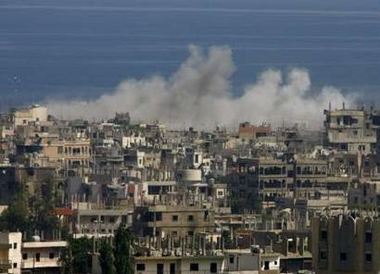
(Battle rages on at the Nahr al-Bared refugee camp in Tripoli, Lebanon in the summer of 2007)
In another example the authors state that, “In Saudi Arabia (last April), government officials said they had arrested 172 men who had plans to attack oil installations, public officials and military posts, and some of the men appeared to have trained in Iraq.”
The other required piece of reading is an extremely interesting profile of Abu Musab al-Zarqawi written by Loretta Napoleoni, a terrorism expert and author, published in Foreign Policy magazine in 2005 following the hotel bombings in Jordan linked to Zarqawi, and before his death. As mentioned above, Fatah al-Islam’s likely leader Shakir al-Abssi, was an associate of Abu Musab al-Zarqawi and fine-tuned his Jihadist skills while fighting in Iraq. Some have speculated al-Abssi was merely a pawn and not the leader of Fatah al-Islam but I don’t buy it, and there was hardly any evidence for this. The piece (which unfortunately in order to access you need to log into Foreign Policy or have access to Lexis Nexis) is called Profile of a killer: Abu Musab al-Zarqawi is the most wanted man in Iraq. How did this high school dropout tie the United States down in its deadliest conflict since the Vietnam War? From the slums of Jordan to the battle of Falluja, this is how it happened. Here, Napoleoni details the rise of the Zarqawi phenomenon, concluding that Zarqawi was not just a bad apple, but really represents a new generation of Jihadists far scarier than the Bin Laden generation, (how many of us right after 9/11 imagined we would be nostalgic for the days of Bin Laden-generation Jihadists?) It is much easier to think of Bin Laden as a special case because he came from an extremely prominent and wealthy family that afforded him close ties to the Saudi Royal family and the capability to fund Al Qaeda through his personal wealth. Zarqawi had none of these things — he was truly a nobody who grew up in a poor family in the city of Zarqa, Jordan (where he gets his name from) and served time in jail over such petty things as drug possession and sexual assault. But as Napoleoni argues, that is precisely why the man, and the new generation of Jihadists he epitomizes is so frightening.
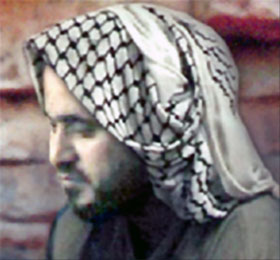
(Zarqawi. Foreign Policy images.)
Napoleoni writes, “Although Zarqawi had demonstrated a zeal for his cause, there was little about him to suggest that he would catapult to the top ranks of the world’s deadliest terrorists. Uneducated and from a poor, working-class family, Zarqawi lacked the pedigree, connections, and financing that marked bin Laden and other senior leaders of al Qaeda… Abu Musab al-Zarqawi was born Ahmad Fadil al-Khalayleh in Zarqa, a Jordanian city north of Amman, in October 1966. Zarqa’s residents have dubbed the city “the Chicago of the Middle East” for its poverty and crime. Zarqawi’s family belonged to a branch of the Bani Hassan, a large East Bank Bedouin tribe loyal to Jordan’s Hashemite royal family. Zarqawi grew up in a miserable, working-class neighborhood where traditional and tribal values mixed badly with the Western consumerism and rapid modernization of the late 1960s. He attended a local school and used his neighborhood cemetery as a playground. He was hardly a star pupil. His teachers remember him as rebellious and unruly…
The anti-American crusade of the Saudi millionaire and the revolutionary jihad of the Jordanian working-class Bedouin had finally merged. From the slums of Zarqa to the battle of Falluja, the life of Zarqawi culminated in his greatest achievement–not his entry into al Qaeda, but giving the Iraqi jihad a new, revolutionary, anti-imperialist meaning.
In a sense, it is the very things that make Zarqawi seem most ordinary–his humble upbringing, misspent youth, and early failures–that make him most frightening. Because, although he may have some gifts as a leader of men, it is also likely that there are many more “Zarqawis” capable of filling his place. His rise is a sign that the jihadist movement is widening and democratizing in the blood and violence of Iraq. Al Qaeda’s old leadership, now trapped inside the tribal belt between Pakistan and Afghanistan, has apparently accepted and embraced this change-the transformation from a small, elitist vanguard to a mass movement. Most likely, this shift for bin Laden and al Qaeda is one borne of necessity, not a desired change in tactics. Either way, it surely means that the battlefield will grow wider still.”
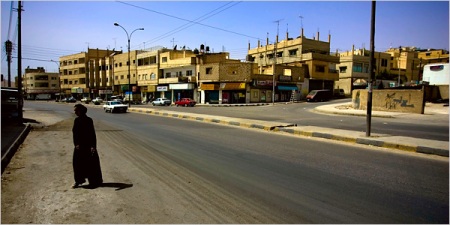
(Zarqa, Jordan, the hometown of Abu Musab al-Zarqawi. Bryan Denton, New York Times images)
We have already seen the harmful effects towards regional stability caused by another Middle East refugee problem, the Palestinian refugee problem, created in 1948 and unresolved to this day. In light of this past precedent there is reason to fear the emerging Iraqi refugee problem and the spread of Iraq war veterans in the region. More important than the issue of who is to blame for the Palestinian refugee problem is the fact that it continues — and with disastrous results for the region. To name just a few of the larger resulting wars and conflicts borne of the Palestinian refugee problem; a mini-war emerged between Israel and Palestinian infiltrators (fedayeen) after 1948 which, in part, led to Israel’s participation in the Suez War of 1956 in which it attempted to stop Palestinian infiltrators coming in from Egypt. Other examples include Israel’s ongoing war with the PLO and splinter groups beginning with the PLO’s creation in 1964, the Jordanian civil war against Palestinian guerrilla organizations in 1970 which killed an estimated 3,500 people on both sides and nearly toppled the Jordanian government of King Hussein, PLO provocations against Israel from southern Lebanon which brought about Israel’s invasion upon that country and so on.
One key difference is that the Iraqi refugees are likely to return if and when Iraq stabilizes because, unlike in the case of the Palestinian refugee problem, neighboring countries don’t have an interest in prolonging the crisis indefinitely as they did in using the Palestinian refugees as a political weapon against Israel. On the contrary, neighboring Arab states would be most happy to rid themselves of the Iraqi refugees and the strained infrastructures, crime, prostitution and violence — borne of desperation — that they bring with them. In addition, any future Iraqi government and the majority of Iraqis will most likely accept and even desire for their brethren to return (even if to new sectarian boundaries drawn up within the country) because, in contrast to the Israeli case after 1948, the Iraqi refugees are unlikely to be perceived as constituting the threat of a fifth column or the threat of bringing national war to Iraq to the degree the Palestinians were perceived to constitute this threat by Israel after 1948.
That said, hope you all have a nice Thanksgiving!
“South America’s four-nation trading bloc Mercosur is poised to clinch an historic free trade pact with Israel, officials said Wednesday. The deal, expected to be completed Thursday, would be the first free-trade agreement for Mercosur, a market of nearly 250 million people covering most of the South American continent. “The idea is to finish all the details and wrap up the whole thing tomorrow (Thursday),” said Itzhak Levanon, Israel’s ambassador to international organizations in Geneva…“ Click for full article
